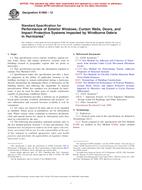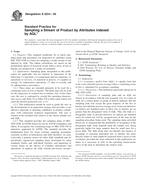1.1 These test methods cover the testing of industrial yarns made of glass filaments, cords twisted from such yarns, and fabric woven from such cords-products that are made specifically for use in the manufacture of pneumatic tires. By agreement, these test methods may be applied to similar glass yarns and cords used for reinforcing other rubber goods and for other industrial applications. The yarn or cord may be wound on cones, tubes, bobbins, spools, or beams, woven into fabric, or in other forms. These test methods include testing procedures only. These test methods do not include specifications or tolerances.
1.2 No procedure is included for the determination of fatigue resistance of cords, but several articles relating to the measurement of fatigue resistance of cords made from man-made filaments and cured in rubber were published in the bibliography of Test Methods D 885.
1.3 The following sections are included:
| Section | |
| Adhesion of Cords to Elastomers | 24 |
| Breaking Strength (Force) of Conditioned Yarns and Cords | 13 |
| Breaking Tenacity of Conditioned Yarns and Cords | 14 |
| Catenary Length of Cords | Appendix X1 |
| Conditioning | 8 |
| Construction of Yarns and Cords | 18 |
| Count of Tire Cord Fabric | 22 |
| Dip Pick-Up (DPU) on Yarns and Cords | 23 |
| Elongation at Break of Conditioned Yarns and Cords | 15 |
| Initial Modulus of Conditioned Yarns and Cords | 16 |
| Keywords | 28 |
| Mass of Tire Cord Fabric | 22 |
| Precision and Bias | 25-27 |
| Sampling of Yarn and Cord | 6 |
| Sampling of Tire Cord Fabric | 7 |
| Tensile Properties of Yarns and Cords | 9-17 |
| Terminology | 3 |
| Thickness of Cords | 21 |
| Twist in Yarns and Cords | 20 |
| Width of Tire Cord Fabric | 22 |
| Yarn Number of Dipped Yarns and Cords | 19 |
1.4 These test methods show the values in both SI units and in inch-pound units. “SI units” is the technically correct name for the system of metric units known as the International System of Units. “Inch-pound units” is the technically correct name for the customary units used in the United States. The values stated in either acceptable metric units or other units shall be regarded separately as standard. The values expressed in each system may not be exact equivalents; therefore, each system must be used independently of each other without combining values in any way.
1.5 This standard does not purport to address all of the safety concerns, if any, associated with its use. It is the responsibility of the user of this standard to establish appropriate safety and health practices and determine the applicability of regulatory limitations prior to use.
1.5 These tests are used to determine the tensile properties of yarns and cords.
Product Details
- Published:
- 10/01/2004
- Number of Pages:
- 10
- File Size:
- 1 file , 93 KB
- Redline File Size:
- 2 files , 160 KB


